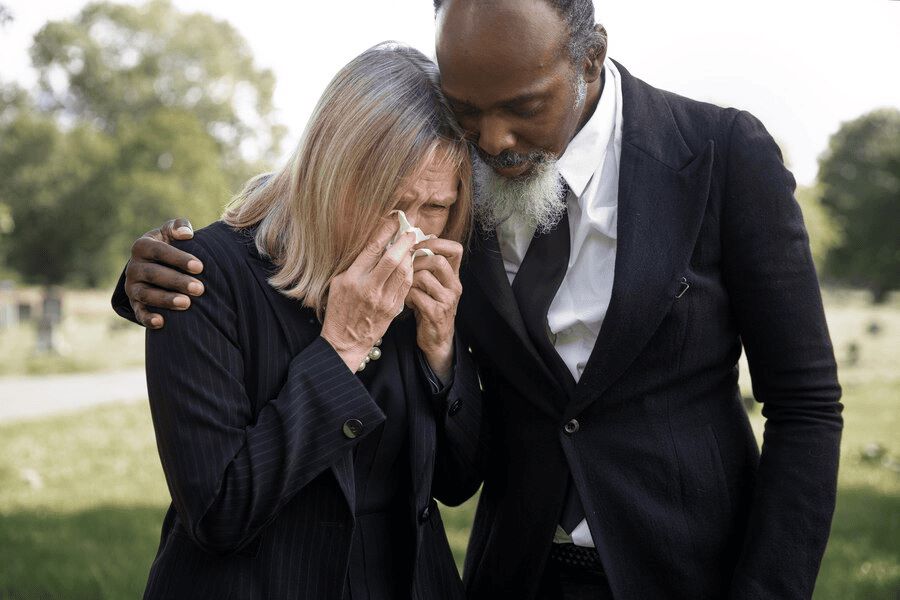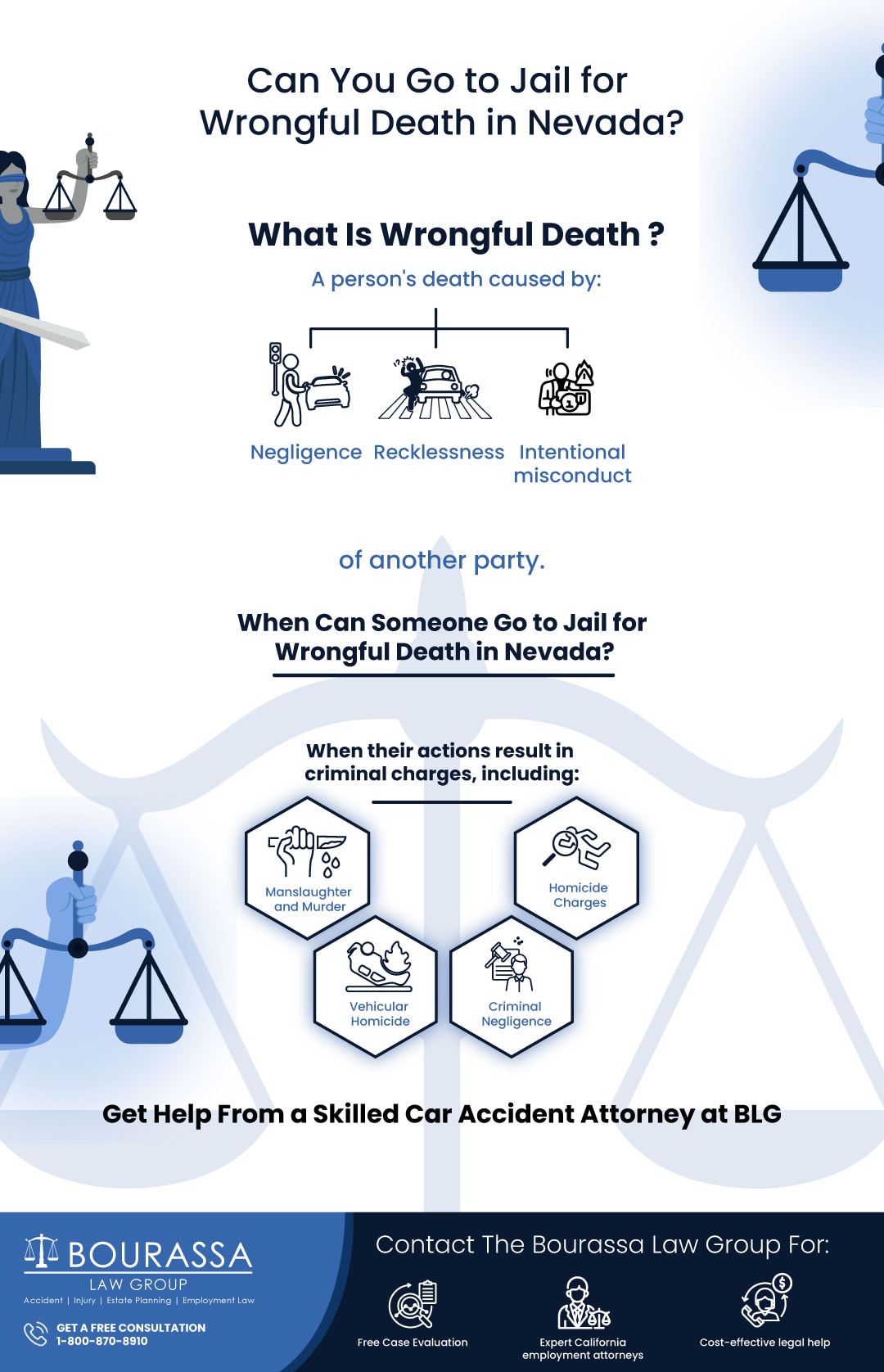
Losing a loved one, or a loved one’s death, is an agonizing experience no matter how it occurs. But when a loved one’s death occurs due to someone else’s negligence or wrongful actions, it can leave you with an even more complicated whirlwind of emotions. Can the responsible party face jail time for their actions? Can you sue someone for causing a wrongful death? In this comprehensive guide, we will explore the legal consequences surrounding wrongful death in Nevada.
What Is Wrongful Death ?
Wrongful death is a legal term describing a situation where a person’s death is directly caused by the negligence, recklessness, or intentional wrongdoing of another party.
Wrongful death is a civil claim or lawsuit filed by the deceased person’s surviving family members or their personal representative seeking financial compensation for the losses incurred due to the death. This compensation typically covers expenses such as medical bills, funeral costs, lost income, and emotional suffering, with the primary purpose of compensating the deceased’s loved ones for their loss as well as holding the responsible party accountable for their actions financially.
Wrongful death cases can result from various circumstances, including accidents, medical malpractice, product defects, or other forms of negligence.
Types of Wrongful Death Cases
Wrongful death cases can arise in various situations where a person’s death is caused by the negligence, recklessness, or intentional misconduct of another party. Here are some common types of wrongful death cases:
Car Accidents: Wrongful death can occur in car accidents due to factors like speeding, drunk driving, distracted driving, or reckless behavior.
Medical Malpractice: When medical professionals provide services that fail to meet the required standard of care, resulting in a patient’s death, it may lead to a wrongful death claim.
Product Liability: Defective products that cause fatal injuries can result in wrongful death cases. This includes faulty machinery, drugs, or other consumer products.
Workplace Accidents: Fatal workplace accidents, especially in high-risk industries like construction or manufacturing, can lead to wrongful death claims.
Criminal Acts: Deaths resulting from criminal acts, such as assault or battery, can lead to both criminal charges and wrongful death claims.
Nursing Home Negligence: Neglect or abuse in nursing homes that leads to a resident’s death may result in a wrongful death claim.
Dangerous Premises: Fatal accidents on poorly maintained or hazardous properties can lead to wrongful death cases. This includes slip and fall accidents.
Defective Drugs or Medical Devices: If a person dies due to the use of a defective drug or medical device, a wrongful death claim may be pursued.
Police Brutality or Excessive Force: In cases where excessive force by law enforcement leads to death, wrongful death claims may be filed against the officers or their agencies.
Boating or Recreational Accidents: Wrongful death can occur in accidents on water, such as boating, swimming, or other recreational activities.
Pedestrian or Bicycle Accidents: Fatalities involving pedestrians or cyclists, often caused by reckless drivers, can lead to wrongful death cases.
Aviation Accidents: Fatalities in plane crashes or other aviation accidents can result in wrongful death claims against airlines or manufacturers.
How Do Wrongful Death Lawsuits Differ From Criminal Charges?
The difference between a wrongful death lawsuit and a criminal charge lies in their nature, purpose, burden of proof, and potential outcomes. Here’s a breakdown of the key distinctions:
Wrongful Death Lawsuit:
Nature:
Civil matter: A wrongful death lawsuit is a civil legal action filed by the surviving family members of the deceased person or their personal representative. It seeks financial compensation for the losses resulting from the death.
Purpose:
Compensation: While money can never replace a lost loved one, the primary objective of a wrongful death lawsuit is to seek monetary damages. This can cover various expenses, including medical bills, funeral costs, lost wages, and emotional distress.
Burden of Proof:
Preponderance of the evidence: In a civil case, the burden of proof is lower. The plaintiff must show that it is more likely than not that the defendant’s actions led to the wrongful death.
Outcome:
Monetary compensation: If successful, the outcome of a wrongful death lawsuit is typically a financial settlement or award to the plaintiffs, meant to help alleviate the financial and emotional burden caused by the wrongful death.
Criminal Charge:
Nature:
Criminal matter: Criminal charges are initiated by the state or federal government, not by the family of the deceased. They involve the prosecution of the responsible party for their actions, which are deemed criminal in nature.
Purpose:
Accountability and punishment: Criminal charges aim to hold the responsible party accountable for their actions and, if found guilty, impose penalties as a form of punishment, including imprisonment.
Burden of Proof:
Beyond a reasonable doubt: In a criminal case, the burden of proof is much higher. The prosecution must prove the defendant’s guilt beyond a reasonable doubt, a significantly higher standard compared to civil cases.
Outcome:
Criminal penalties: If found guilty in a criminal case, the responsible party may face various penalties, including imprisonment in a correctional facility. The primary objective is not financial compensation but the imposition of criminal consequences.
Is Wrongful Death a Crime?
Wrongful death itself is not a crime. Wrongful death is a civil matter, not a criminal one. It occurs when a person’s death results from the negligence, recklessness, or intentional misconduct of another party. However, while wrongful death is a civil matter, it can lead to criminal charges in certain circumstances.
Criminal charges may be filed if the responsible party’s actions involve gross negligence or intentional harm, potentially resulting in charges such as manslaughter, murder, or vehicular homicide. If found guilty in a criminal court, the responsible party may face criminal penalties, including imprisonment. The distinction between wrongful death as a civil matter, focusing on financial compensation for survivors, and wrongful death as a basis for criminal charges depends on the specific circumstances and the evidence presented in the case.
When Does Someone Go to Jail for Wrongful Death in Nevada?
In Nevada, individuals may go to jail for wrongful death action when their actions result in criminal charges. Criminal charges for wrongful death can be filed in situations involving gross negligence, recklessness, or intentional harm. Specific circumstances that may lead to jail time for wrongful death in Nevada include:
Manslaughter and Murder
In cases where the death is a result of intentional harm or severe negligence, individuals may face criminal charges such as manslaughter or murder. These charges can carry significant prison sentences, including life imprisonment or, in some cases, the death penalty.
Vehicular Homicide
If someone’s wrongful death is a result of a motor vehicle accident, especially due to factors like drunk driving or reckless behavior, the at-fault party may be charged with vehicular homicide. This can lead to imprisonment.
Criminal Negligence
Criminal negligence comes into play when a person’s actions show an extreme disregard for the safety of others and result in a wrongful death. In such cases, criminal charges and potential jail time are possible.
Homicide Charges
In cases where wrongful death occurs due to criminal actions, such as assault or battery, the responsible party may face homicide charges. This can result in imprisonment if found guilty.
It’s essential to recognize that criminal charges for wrongful death are initiated by the state, not by the family of the deceased. In a criminal case, the burden of proof is considerably higher compared to a civil case, as the prosecution must prove guilt beyond a reasonable doubt.
Who Can File a Wrongful Death Lawsuit?
In wrongful death cases, the eligibility to file a lawsuit typically falls upon specific individuals or entities as defined by the laws of each jurisdiction. The eligibility to file a wrongful death lawsuit generally includes the following parties:
Immediate Family Members:
This typically includes the deceased person’s spouse, children, and in some cases, parents. Immediate family members are usually given priority when it comes to filing a wrongful death lawsuit.
Personal Representative of the Estate:
In cases where there are no surviving immediate family members, or if the family members choose not to pursue a lawsuit, the personal representative of the deceased person’s estate may file the lawsuit on behalf of the estate and any potential beneficiaries.
Dependents and Financial Beneficiaries:
In some jurisdictions, individuals who were financially dependent on the deceased person, such as stepchildren or putative spouses (those who believed in good faith that they were married to the deceased), may have the right to file a wrongful death lawsuit.
Distant Relatives:
Depending on the specific laws of the jurisdiction, distant relatives, such as siblings or grandparents, may have the right to file a wrongful death lawsuit if there are no immediate family members, dependents, or personal representatives available to do so.
Role of the State in Criminal Cases
In criminal cases, the state or federal government takes on the role of prosecuting the responsible party. If someone is found guilty in a criminal homicide case, they may face severe criminal penalties, including imprisonment in a correctional facility. In such cases, the goal is not financial compensation but rather holding the at-fault party accountable for their actions.
The Importance of Legal Action
When a wrongful death occurs, pursuing legal action is often necessary to achieve justice and closure for the surviving family members. By filing a wrongful death lawsuit, family members can hold the responsible party accountable for their actions and seek financial compensation. This compensation can help alleviate the financial burden caused by the wrongful death and provide a sense of justice for the family.
Wrongful death settlements and compensation are a critical aspect of legal proceedings in cases where a person’s death is caused by the negligence, recklessness, or intentional misconduct of another party. These settlements aim to provide financial relief to the surviving family members or beneficiaries of the deceased. Here’s an overview of wrongful death settlements and the compensation they may cover:
The Role of an Experienced Attorney
When you find yourself in the midst of a potential wrongful death case, the presence of an experienced attorney becomes not just beneficial but essential. A wrongful death lawyer possess a unique set of skills in building and handling wrongful death cases, enabling them to navigate intricate legal terrain effectively. Here’s how an experienced attorney plays a pivotal role:
Navigating Legal Complexities:
Wrongful death cases involve complicated legal processes, and an experienced attorney is well-versed in these complexities. They understand the nuances of both civil and criminal aspects, ensuring that your case is properly preserved and presented.
Protection of Your Rights:
Your attorney serves as your advocate, safeguarding your rights throughout the legal proceedings. They ensure that you are treated fairly and that your interests are protected at every step.
Evidence Gathering:
Attorneys are skilled at collecting, preserving, and presenting evidence. They know how to uncover critical details that can bolster your case.
Building a Strong Case:
An experienced attorney will meticulously build a robust case on your behalf. They use their legal expertise to construct compelling arguments that support your position, increasing the likelihood of a favorable outcome.
Representation in Court:
Whether your case goes to court, your attorney is your representation. They will present your case, cross-examine witnesses, and argue on your behalf, ensuring that your perspective is heard and considered.
Expert Legal Guidance:
Attorneys provide invaluable legal guidance, explaining your options and potential outcomes in a way that’s easy to understand. This allows you to make informed decisions during what can be an emotionally challenging time.
Strategic Decision-Making:
Attorneys are skilled strategists. They help you determine the best course of action, whether it involves pursuing a civil lawsuit for compensation.

Consult an Experienced Wrongful Death Attorney at BLG
In Nevada, criminal charges can be filed in cases of extreme negligence or intentional harm. The severity of the charges and the potential for jail time depend on the specific circumstances and the evidence presented in the case.
If you are facing the complexities of a wrongful death case, whether it’s in civil court or criminal charges, seeking the counsel of an experienced attorney is crucial. They can provide the legal expertise and support you need to navigate the legal system and work towards a just resolution in the wake of a tragic loss. Remember, you don’t have to face this challenging journey alone. Reach out to a law office for a free consultation to discuss your case and explore your legal options.
Contact the experienced wrongful death attorneys at BLG if you have questions or concerns about wrongful death cases. We’re here to help you navigate the complexities of the legal system and ensure your rights are protected.
Book your free consultation appointment today!





